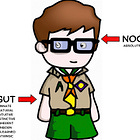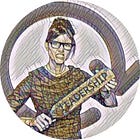So which is it? Are leaders born or bred? Are they delivered by the proverbial stork, or are they mainly a product of their story? As I cruise the podcast circuit as a guest, this question keeps popping up: Is leadership innate or something that must be cultivated over time?
Many argue that leadership is in our genes, an inborn talent that arrives via special delivery by that celestial stork. And there’s some truth there. Some people burst with leadership ability early on for whatever reason. I call this “gut leadership”—instinctual, yes, intuitive too, yet inadequate.
I’ve told the tale of how I was a gut leader for most of my life and the limitations of leading by feeling.
Meanwhile, I’ve come to learn that leadership greatness only derives from treating leadership as a discipline to be studied, understood, and mastered—like any other complex craft.
So, while some leadership traits may arrive in the cradle, truly great leaders aren’t just born great. Greatness comes from effort, reflection, and learning. Like any skill, leadership can be acquired and cultivated whether you are favored with innate talent or not. So forget that leadership stork; what truly matters is the leader’s origin story.
You can think of it like a superhero’s genesis tale. How do those myriad caped crusaders go from ordinary slob to heroic superhuman? It’s not all just mutations, cosmic rays, radioactive arachnids, and other comic-book hokum. The real grist is the saga of their choice to use their powers for good and to resist the lure of the bad. After all, supervillains have their own origin stories—how they came to opt into evil over virtue—and, let’s face it, supervillainy looks like a lot more fun. So why pass up all that hedonism and self-gratification to be a selfless superhero?
For leaders, it’s the same deal. Why be a leader rather than settling for the facile temptation of bossdom? I’m guessing the cause isn’t ever as exotic as a rocket trip from the planet Krypton, but was it a sudden epiphany or a gradual awakening? What put them on their path to leadership greatness?
Of course, true leadership has real, tangible, and even measurable benefits. Good leaders provide stability, increased productivity, inspiration, and innovation. Nonetheless, it doesn’t take inordinately keen discernment to notice that most managers eschew leadership greatness and settle for being mere bosses. So, what does a leadership origin story look like? What causes someone to choose the challenge of leadership over the heedlessness of bossdom?
Maybe my own tale will help. I’ve scattered all the shards of my leadership story throughout On Leading with Greatness but never as one coherent narrative. Until now!
Let me be clear up front. I’m no paragon of leadership greatness, at least not yet. I’ve had my successes just as I have had my failures. The point is to always strive to learn and grow. What I can offer is the tale of how I consciously chose to start on the path of great leadership instead of sinking into mere bossdom. It began as a troubling sense that there had to be a better way. A slow-burning realization that led to the truth.
From an early age, I’ve found myself thrust into leadership roles—often well before my time—leading a Boy Scout troop, managing employees at 18, being elected as a student leader, serving as a union leader. Eventually, I became a university faculty leader, which led to my appointment as the dean of the School of Humanities and Social Sciences at my university.
That last one was a great honor, but it came with a bit of a hitch, seeing how there was no School of Humanities and Social Sciences. So, I became the founding dean, charged with making it all work. Initially assembling the school was pretty basic, just nuts and bolts, this goes with that. But getting the school up and running and keeping it running smoothly? Those were massive challenges with stakes beyond anything I had encountered. They would require leadership skills well above the gut level.
I did the obvious at first, looking to my superiors for guidance and models, but they were useless. The provost, my immediate boss, was too self-absorbed and unself-aware to be a mentor, and the president was just another high-titled narcissist who secreted toxicity.
I turned to my peers, my fellow deans, but they were flailing as badly as I was. Still, I followed their lead, and before long, I found myself suffocating in their miasma of workaholism, perfectionism, and micromanagement. I was appalled by what I had become.
Then one spring morning, I had an epiphany. I was in a meeting when I excused myself early, pompously announcing that I had to “go put out a fire.” The others in the meeting were suitably impressed by my grandiose crisis language—just as I’d hoped—but as I marched to my office, the reality of my so-called crisis hit me. It was nothing more than having to place a phone call. “Putting out a fire” was, in fact, the way my feckless bosses and supercilious peers talked and thought, and it was nonsense. True crises in the academic world were exceedingly rare. In that moment, I knew I was a fraud. We were all frauds. “What am I doing?” I thought. Right then I resolved to recalibrate my outlook.
As it happens, a month or so later, I was in Ireland to teach for our study abroad program. Those weeks away were just the respite I needed to gain some distance and perspective. I returned with a renewed commitment to learn more about leadership and to align my management style to my true character.
I started treating leadership as my new discipline and began my journey of reading, attending workshops and trainings, earning leadership certificates, experimenting, and making countless mistakes—all opportunities for growth.
Many of the leadership principles I discuss in On Leading with Greatness were formulated during that transformative period, such as “radical transparency.” and the conclusion that “Every leadership challenge is a teaching challenge.” My leadership practices stood in sharp contrast to my peers’ and bosses’ habits and behaviors at that university and—I would discover—throughout much of higher education.
After seven horrible years, I moved on from that den of dysfunction to serve as a vice president and provost elsewhere, eventually landing at a college that had an obvious need for reform and ostensibly hired me to help them on their way. It turns out, though, that the rot of their longstanding scarcity mindset permeated the administration and even the board, rendering them unwilling to move or change. Instead, success there was measured by how effectively you maintained the status quo while real progress was anathema to that broken institution.
The prospect of grappling with yet another disordered culture and the apparent state of the education industry ultimately led me to leave higher ed altogether. But through it all, I discovered my true passion—guiding and mentoring the next generation of great leaders—which is why I founded Guidance for Greatness.
So, there you have it—my leadership origin story. Whatever leadership prowess I possess, some likely arrived via the celestial stork but most derived from my story of hard-won experience, study, and an unwavering commitment to growth in the field of leadership. And, of course, my quest for greatness continues.
What's your leadership origin story? How will your journey unfold since that pivotal choice to lead rather than boss? After all, the tale is never fully written. The next chapters await!
How do you recount your leadership origin story? Is there a single moment or period when you consciously chose the path to great leadership?
Great leaders make a point of understanding their life choices and why they made them, and I can help.
Unlock the Great Leader Within! Download my free resource, the Transform To GREATness Toolkit, now!
I look forward to hearing from you.
Intro and outro podcast theme music by LiteSaturation from Pixabay.
If you want to invite me speak at your event or appear on your podcast, visit these pages for more information:
























Share this post